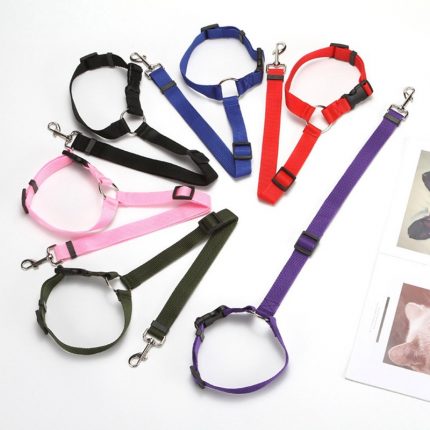Why Does My Dog’s Breath Smell Like Metal?
As pet owners, we are accustomed to our furry friends having a certain odor, but what happens when that smell takes an unusual turn? If you’ve noticed that your dog’s breath has a metallic scent, you may be wondering what could be causing this peculiar phenomenon. While it may seem alarming at first, there are several potential reasons behind why your dog’s breath smells like metal.
One possible explanation for this metallic odor is dental issues. Just like humans, dogs can suffer from dental problems such as gum disease, tooth decay, or oral infections. When these issues go untreated, bacteria can accumulate in the mouth, leading to a foul smell. In some cases, the smell may resemble metal due to the presence of blood in the gums or teeth, which can result from inflammation or injury.
Another factor to consider is your dog’s diet. Certain foods can contribute to a metallic smell in your dog’s breath. For instance, if your dog consumes a diet high in iron or copper, it can affect the odor of their breath. Additionally, some medications or supplements containing minerals can also cause a metallic scent. It’s essential to review your dog’s diet and consult with your veterinarian to ensure they are receiving a balanced and appropriate nutrition.

Furthermore, a dog’s breath can sometimes smell metallic due to underlying health conditions. Conditions such as kidney disease, diabetes, or liver problems can produce a distinct odor in a dog’s breath. These conditions may affect the body’s metabolism, leading to the production of certain chemicals that can result in a metallic scent. It’s crucial to monitor your dog’s overall health and seek veterinary attention if you suspect any underlying medical issues.
In conclusion, while it may be concerning to notice your dog’s breath smelling like metal, there are various potential causes for this occurrence. Dental issues, dietary factors, and underlying health conditions can all contribute to this unusual odor. As responsible pet owners, it is essential to pay attention to changes in our pets’ breath and overall health. Regular dental care, a balanced diet, and routine veterinary check-ups can help prevent and address any potential issues that may arise. By staying vigilant and proactive, we can ensure our furry companions’ well-being and keep their breath smelling fresh and pleasant.
Exploring the Causes of Metallic Dog Breath
When it comes to our furry companions, their breath can often be a topic of concern and curiosity. While it is normal for a dog’s breath to have a certain odor, a metallic scent can be quite perplexing. In this article, we will delve into the various reasons why your dog’s breath may smell like metal and what you can do about it.
Dental Issues
One of the primary culprits behind a dog’s metallic breath is dental problems. Just like humans, dogs can develop issues such as gum disease, tooth decay, or oral infections. These conditions can lead to the accumulation of bacteria in the mouth, resulting in an unpleasant smell. In some cases, the metallic scent may be due to the presence of blood in the gums or teeth, caused by inflammation or injury. Regular dental care, including brushing your dog’s teeth and routine veterinary check-ups, can help prevent and address these dental issues.
Dietary Factors
The food your dog consumes can also play a role in the odor of their breath. Certain foods, particularly those high in iron or copper, can contribute to a metallic smell. Additionally, some medications or supplements containing minerals can have a similar effect. It is essential to review your dog’s diet and consult with your veterinarian to ensure they are receiving a balanced and appropriate nutrition. Your vet may recommend adjusting their diet or providing specific dental chews or treats that can help improve their breath.

Underlying Health Conditions
In some cases, a metallic odor in a dog’s breath can be an indication of underlying health conditions. Conditions such as kidney disease, diabetes, or liver problems can affect a dog’s metabolism, leading to the production of certain chemicals that result in a metallic scent. If you notice persistent metallic breath along with other symptoms such as increased thirst, frequent urination, or changes in appetite, it is crucial to seek veterinary attention. Early detection and proper management of these conditions can help improve your dog’s overall health and eliminate the metallic odor.
Practical Recommendations
While identifying the cause of your dog’s metallic breath is important, taking practical steps to address the issue is equally essential. Here are some recommendations to help combat the metallic odor:
- Regular Dental Care: Establish a dental care routine for your dog, including brushing their teeth regularly and scheduling professional dental cleanings.
- Proper Diet: Ensure your dog is receiving a balanced and appropriate diet. Consult with your veterinarian to determine if any dietary adjustments are necessary.
- Water Consumption: Encourage your dog to drink plenty of water to maintain proper hydration, which can help flush out toxins and reduce the intensity of the metallic smell.
- Veterinary Check-ups: Schedule regular check-ups with your veterinarian to monitor your dog’s overall health and detect any underlying conditions early on.
- Supplements and Treats: Consider using dental chews or treats recommended by your veterinarian to help improve your dog’s oral health and freshen their breath.
Conclusion
In conclusion, understanding why your dog’s breath smells like metal can be crucial for their overall health and well-being. For a deep dive into this topic and related canine health issues, visit geepets.com. Here, you’ll find comprehensive articles and resources that tackle various aspects of pet care, including dental health, diet, and much more.
Additionally, for further reading and external resources, the American Kennel Club (akc.org) offers a wealth of information on dog health, training, and nutrition that can provide valuable insights into maintaining your dog’s health, including addressing concerns related to unusual breath odors. Understanding the root cause behind your dog’s metallic breath smell can lead to better health outcomes and a happier life for your furry friend.
Practical Recommendations for Addressing Metallic Dog Breath
1. Regular Dental Care:
Establishing a consistent dental care routine for your dog is crucial in preventing and addressing metallic breath. Brush your dog’s teeth regularly using a dog-friendly toothbrush and toothpaste. Aim for at least three times a week, if not daily, to remove plaque and bacteria buildup. Additionally, schedule regular professional dental cleanings with your veterinarian to ensure thorough oral hygiene.
2. Proper Diet:
To help combat the concern of “Why Does My Dog’s Breath Smell Like Metal,” it’s crucial to ensure your dog is receiving a balanced and appropriate diet. When pondering over “Why Does My Dog’s Breath Smell Like Metal,” consulting with your veterinarian becomes a pivotal step. They can determine if any dietary adjustments are necessary to address the question of “Why Does My Dog’s Breath Smell Like Metal.” They may recommend specific dog food formulas that promote oral health, which is directly connected to mitigating the issue of “Why Does My Dog’s Breath Smell Like Metal,” or provide guidance on adding fresh fruits and vegetables to your dog’s diet to help freshen their breath.
In dealing with the concern of “Why Does My Dog’s Breath Smell Like Metal,” avoid feeding your dog foods high in iron or copper, as they can contribute to the metallic odor. This adjustment is a proactive approach to directly tackle the underlying issue behind “Why Does My Dog’s Breath Smell Like Metal.” By following these guidelines and working closely with your veterinarian, you can make informed choices about your dog’s diet to help reduce or eliminate the metallic breath, directly addressing the concern of “Why Does My Dog’s Breath Smell Like Metal.”
3. Water Consumption:
Encouraging your dog to drink plenty of water throughout the day is crucial, especially if you’re wondering, “Why does my dog’s breath smell like metal?” Adequate hydration helps maintain oral health by flushing out toxins and bacteria that can contribute to the metallic smell, thereby addressing your concern of “Why does my dog’s breath smell like metal?”
Ensure your dog has access to clean, fresh water at all times, particularly after meals and physical activity, to combat the issue of “Why does my dog’s breath smell like metal?” This constant availability of water is key in mitigating the reasons behind the question, “Why does my dog’s breath smell like metal?” By promoting better hydration, you’re directly tackling the factors that may lead to the concern of “Why does my dog’s breath smell like metal?” ensuring your dog’s mouth is cleaner and less likely to produce unpleasant odors.
4. Veterinary Check-ups:
Schedule regular check-ups with your veterinarian to monitor your dog’s overall health and detect any underlying conditions that may be causing the metallic breath, a concern often encapsulated by the question, “Why Does My Dog’s Breath Smell Like Metal?” Your vet can perform a thorough examination, including oral health assessments, which is crucial when you’re troubled by the thought, “Why Does My Dog’s Breath Smell Like Metal?”

They can recommend appropriate treatments or interventions if necessary. Early detection and treatment of underlying health issues can help eliminate the metallic odor, addressing the worrisome query, “Why Does My Dog’s Breath Smell Like Metal?” This proactive approach ensures that the underlying causes of your dog’s metallic breath, which makes you wonder, “Why Does My Dog’s Breath Smell Like Metal?” are promptly identified and managed.
5. Supplements and Treats:
To improve your dog’s oral health and address concerns like “Why does my dog’s breath smell like metal,” consider using dental chews or treats recommended by your veterinarian. These specially formulated products are essential in reducing plaque and tartar buildup, which can be a contributing factor to the worrying question, “Why does my dog’s breath smell like metal?” Moreover, they promote healthy gums and eliminate bad breath, addressing the underlying issues behind “Why does my dog’s breath smell like metal?”
When selecting these products, it’s crucial to look for treats that are low in fat and sugar to avoid exacerbating the problem or leading to other health issues that might make you wonder, “Why does my dog’s breath smell like metal?” Excessive consumption of these ingredients can negatively impact your dog’s overall health and potentially be a hidden cause behind the concern, “Why does my dog’s breath smell like metal?”
Our featured products:
In summary, by choosing the right dental chews or treats, you can play a significant role in mitigating oral health problems that lead you to ask, “Why does my dog’s breath smell like metal?” Regular use of these veterinarian-recommended products can ensure your dog’s mouth stays clean, healthy, and free from the odors that cause concern.
6. Home Remedies:
In addition to professional dental care and veterinary recommendations, there are some home remedies you can try to combat metallic breath. These include adding a small amount of parsley to your dog’s food, which can act as a natural breath freshener, or using a water additive specifically designed to improve oral hygiene. However, always consult with your veterinarian before trying any home remedies to ensure they are safe and suitable for your dog.
By implementing these practical recommendations, you can help address the issue of metallic breath in your dog. Remember, maintaining good oral hygiene, providing a balanced diet, and seeking veterinary guidance are essential in promoting fresh and pleasant breath for your furry companion.















